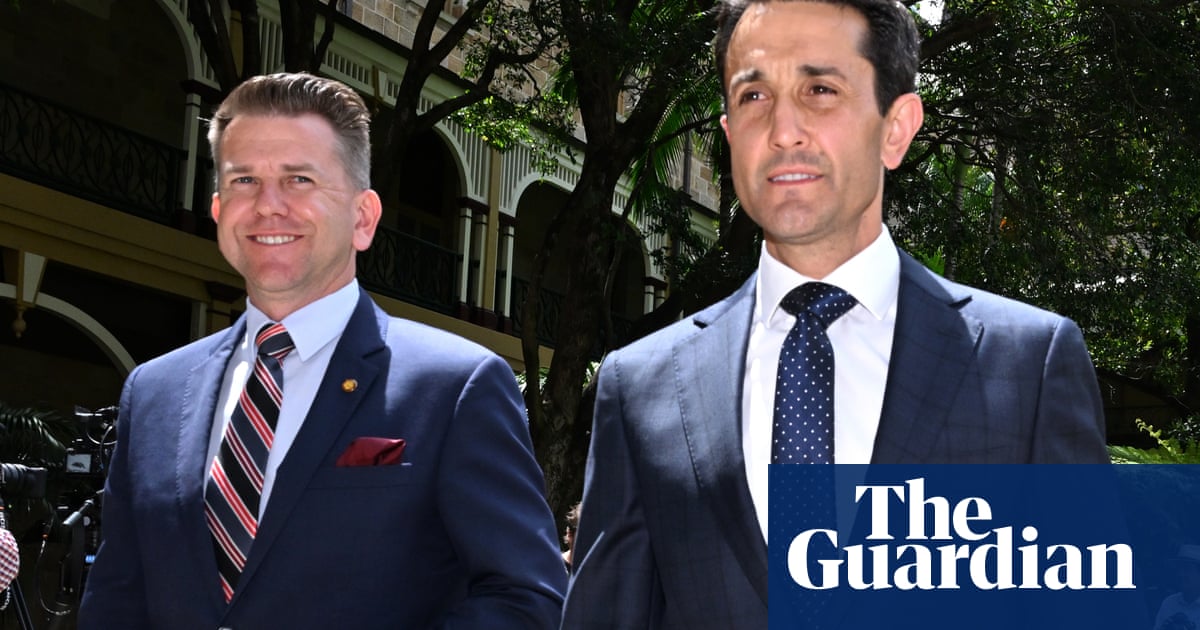The Liberal National party’s axing of a conditionally approved windfarm that could have powered hundreds of thousands of homes risks undermining confidence in the renewable energy sector inQueensland, green and industry groups have warned.
Planned for a site 40km north-west of Rockhampton, Greenleaf Renewables’ $1bn Moonlight Range Wind Farm Project would have been able to power about 260,000 homes, using 88 260-metre turbines. It also included a grid-scale battery.
The project was granted conditional approval by Queensland’s State Assessment and Referral Agency in December last year.
Sign up for Guardian Australia’s breaking news email
But in January the planning minister, Jarrod Bleijie, called the 450-megawatt project in for reassessment, and then denied it approval last week.
The unprecedented decision by Bleijie – who is also the deputy premier – left many warning it would adversely affect the state’s clean energy sector.
“Effectively, they’re sending the signal that Queensland is closed for clean business,” the Queensland Conservation Council’s senior campaigner, Stephanie Gray, said.
The Queensland Renewable Energy Council warned that the decision risks undermining confidence among developers, investors, and suppliers across all infrastructure sectors, not just renewable energy.
Its CEO, Katie-Anne Mulder, called on the state government to “clarify how this decision does not set a precedent for other projects that have received state government approvals”.
The Labor leader, Steven Miles, accused the premier,David Crisafulli, of having an “ideological hatred of renewables”.
“They do not like renewables, and that’s why they are cancelling these projects. But ultimately, every Queenslander will pay a price through higher power bills,” he said.
Bleijie said a local council and about 88% of local residents who made submissions through the planning process opposed the Moonlight Range windfarm.
Bleijie said he cancelled the project out of concern about planned clearing of native vegetation and a lack of off-site workers’ accommodation.
The windfarm would have required clearing about 434 hectares (1,072 acres) of regulated vegetation in an area that has been “heavily impacted by historical land clearing, primarily for cattle grazing”, according to its environmental impact statement.
Greenleaf Renewables has been contacted for comment.
Sign up toBreaking News Australia
Get the most important news as it breaks
after newsletter promotion
Gray called on the state government to expedite planning for the state’s renewable energy zones, to restore certainty.
“We want renewable energy projects to drive a balance in our energy mix,” Crisafulli said on Monday.
“They have to treat communities with respect and decency, and they have to be there for the long term in supporting those communities.”
The LNP member for Mirani, Glen Kelly, said the voices of regional Queenslanders “who host these projects in their back yard” were “finally being heard”.
“Under Labor, local residents affected by these projects had no say, and concerns around the impacts on their communities were ignored,” he said.
Earlier this month, Bleijie sponsored legislation which wouldmake it more difficult for renewables proponents to win environmental approval. The LNP claims the legislation will establish a level playing field between green project and mining proposals.
The government also plans to extend the life ofQueensland’s coal fleet “indefinitely”, according to the premier, and reviewthe state’s emissions reduction target.
The LNP has also signalled amuch more lenientattitudetowards resource projects. The resources minister, Dale Last, told parliament earlier this year: “I have been saying to the gas companies in this state: ‘I’ll sign. You drill.’”
The windfarm’s cancellation comes weeks after the governmentannounced a planto cut funding for the Queensland Environmental Defenders Office from $500,000 to zero, breaking an election promise.
